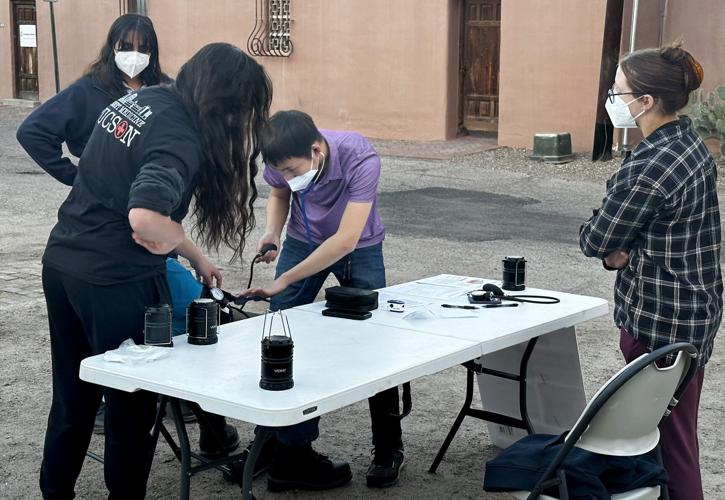Parked behind downtown Tucson’s Z Mansion, an RV occupies a portion of the alley. A graphic of the human cardiovascular system hangs inside the RV on the doorway to a small room with a medical treatment table.
Community members line up to the side door of the vehicle, awaiting free care from medical professionals and from University of Arizona students eager to lend a helping hand.
The students are members of Street Medicine Tucson, a UA group dedicated to helping Tucson’s homeless population. The group operates as a university CUP clinic, which stands for Commitment to Underserved People, alongside other programs, including Flying Samaritans, which provides free medical and dental care in Sonora, and MexZona, which offers medical clinics in Puerto Peñasco, Sonora.
The students involved in Street Medicine Tucson organize monthly clinics with their Mobile Health Unit, the RV fitted with the medical treatment room that they park at the Z Mansion, 288 N. Church Ave. There, people in need of health care are assisted at no charge by volunteer medical practitioners and students.
In addition to administering health care, the students provide resources, including clothing, food, water and seasonal products like hand warmers.
Emmery Kelly, a pre-med student at the UA, is the president of Street Medicine Tucson. Her experience with public health in high school influenced her decision to join the club as a freshman, and the welcoming environment of the club inspired her to take on a leadership role.
The club was formerly called Mobile Medicats but changed its name to gain support from the national Street Medicine organization.
Now with backing from the national association, as well as from the UA medical school, Street Medicine Tucson gets help with insurance, permit acquisitions and funding for the RV. It also receives financial support through appropriations from the Associated Students of the University of Arizona.
The group used to hold its mobile health clinics at Santa Rita Park but encountered challenges when city government altered the permit laws, so it now uses the downtown site.
Z Mansion is an event and wedding venue owned by Reverend Tom Hill, a pastor and a professor in the Health Sciences department at the UA. Through Hill’s WORKship Methodist Church ministry, volunteers help serve the city’s homeless population at the mansion on Thursdays and Sundays.
Rick McCallum is the volunteer coordinator at the Z Mansion and also fills in with pastoral duties when Hill is unavailable. McCallum said volunteers with the WORKship ministry act as a low-barrier service provider at the mansion through their semiweekly clinics, which offer first aid and veterinary services for anyone who needs them.
“Low barrier means if you can show up and crawl through the door using your chin as a shovel, you are welcome,” McCallum said. “You don’t have to have an ID, we don’t care where you were born, we don’t care what your sexual orientation is, we don’t care if you’re grumpy or nasty, we don’t care if you like to act out a little bit. We have one rule: Don’t raise your voice.”
Kelly and Esteban Ureña, a physiology and medical science double major who serves as co-vice president of Street Medicine Tucson, said turnout for the club’s mobile health clinics increased after the move to Z Mansion. They said Z Mansion’s good reputation among the homeless population made it much easier for patients to trust them.
“At our first clinic at Z Mansion (on Jan. 30), we saw the biggest number of patients we’d ever seen,” Kelly said.
All UA students are allowed to be a part of Street Medicine Tucson regardless of their major, and Kelly said that there are no requirements or application process to join.
“We’re always recruiting, and allowing people to come,” Kelly said. “There’s room for anyone and everyone.”
Get a roundup of solutions reporting from the Arizona Daily Star at linktr.ee/starsolutions. Video by Caitlin Schmidt / Arizona Daily Star.






